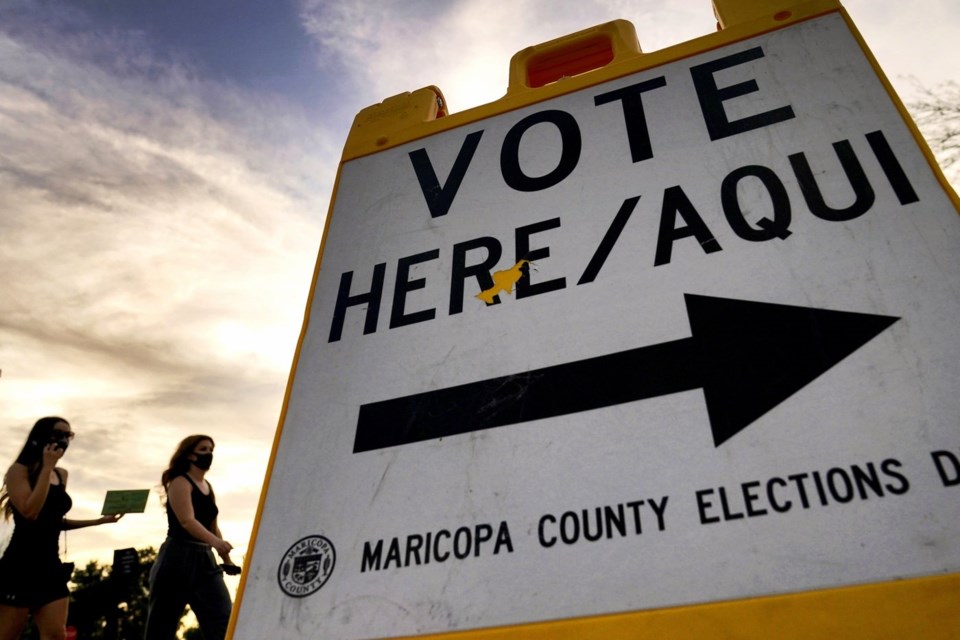PHOENIX (AP) — When Arizona was among the last states to finish tallying ballots cast in the 2024 general election, state Republicans dubbed it the laughingstock of the nation and reignited their push to get faster results.
They fast-tracked legislation aimed at speeding up the counting of ballots by moving up the deadline for voters to drop off early ballots, but Democratic Gov. Katie Hobbs on Tuesday vetoed the measure over concerns that it would make it harder for people to vote.
Her office had threatened a veto earlier this month, leading to negotiations that ultimately failed to produce some compromises Hobbs sought to ensure expanded access for voters, according to her spokesperson, Christian Slater.
“Unfortunately, any potential compromise was rejected, leading me to believe the focus of this legislation is disenfranchising voters, not delivering faster election results for Arizonans,” Hobbs said in her message to lawmakers.
Arizona election results tend to come in after other states in part because of the signature verification process that state law mandates for mail ballots. Voters can currently drop off their mail ballots at polling places until 7 p.m. on Election Day. In recent elections, the state has taken close to two weeks to report its results.
Republican Senate President Warren Petersen was among those who called for moving up the mail ballot drop-off deadline by four days. The Arizona Association of Counties said the majority of the state's county recorders supported the bill. He called the veto a “huge mistake.”
Petersen said the bill mirrored a system in Florida, where the overwhelming majority of votes are reported on election night, allowing for faster race calls.
In a post on X, Arizona House Speaker Steve Montenegro accused Hobbs and Democratic legislators of blocking reforms aimed at ensuring timely and transparent election results.
"If they won’t act, we will — letting Arizona voters have the final say,” he said, referring to another proposal that passed the House and is headed to the Senate. That measure, like the failed legislation, would put the question of moving up the mail ballot drop-off deadline, among other election administration reforms, before voters.
Arizona has been a pioneer in expanding vote by mail since the 1990s, but only in the past decade has the pace of vote counting become an issue. When Republicans dominated the state, winners of most races were apparent on election night even as election officials continued counting ballots. But statewide races are now much closer, decided in some cases by a fraction of a percentage point, delaying the time when media organizations can declare a winner and drawing national scrutiny from voters eager to know the outcome of the presidency and key congressional races.
Maricopa County Recorder Justin Heap, a former GOP state legislator who questioned the administration of elections in Arizona’s most populous county, called the veto shortsighted and partisan.
Pinal County Recorder Dana Lewis, who supported the bill, said the proposed deadline would have enabled elections officials to collect the majority of mail ballots prior to election night, allowing them to start the signature verification process earlier.
If a Friday deadline was implemented and officials were unable to verify a voter’s signature, voters would have been able to vote at the polls on Election Day rather than waiting up to five days after election night for their ballot to be fixed, Lewis said.
Pima County Recorder Gabriella Cázares-Kelly, a citizen of the Tohono O’odham Nation, said in a committee hearing that the bill would have disproportionately impacted voters in rural and tribal communities. ___ The Associated Press’ women in the workforce and state government coverage receives financial support from Pivotal Ventures. AP is solely responsible for all content. Find AP’s standards for working with philanthropies, a list of supporters and funded coverage areas at AP.org.
Sejal Govindarao, The Associated Press



